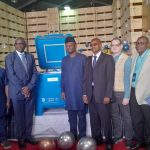A recent study conducted and presented to the International Communication Division of the Association of Educators in Journalism and Mass Communication (AEJMC) conference found that African journalists tend to favour the United States over China in their reporting, despite a perceived shift towards China amongst African publics.
The study, which was carried out by two African PhD candidates at the University of Colorado Boulder, in the United States, titled, Hierarchy of influences and mediated public diplomacy: The case of China’s and the United States’ footprints on African news media, examined the role of journalistic norms and practices in shaping mediated public diplomacy (MPD) in Nigeria and Egypt.
According to the study, the majority of foreign affairs journalists in Nigeria and Egypt have a more favorable view of the United States foreign missions in both countries, compared to those of China.
This preference influences how these journalists engage with foreign news sources, with the United States seeing their diplomatic communication disproportionately reported on by the news media in both countries.
The study’s findings suggest that several factors contribute to this preference. At the individual level, Nigerian journalists’ political attitudes towards democracy played a significant role in shaping their interest in US diplomatic messages.
As one journalist noted, “I think the US is a model democracy… I tend to pay more attention to US diplomatic messages because they align with my values.”
In contrast, Egyptian journalists’ political attitudes did not appear to shape their interest in US or Chinese messages.
However, the study found that Egyptian journalists highlighted strong access to US media relations teams, which provided them with timely and newsworthy information.
At the routines level, the study found that journalists’ dependence on press subsidies and verification norms also played a significant role. Nigerian journalists, facing resource shortages, relied heavily on embassy press releases for international coverage, giving US messages an edge.
US embassies issued more frequent, timely, and newsworthy releases, which were more likely to be picked up by local media.
The study’s content analysis confirmed these findings, showing that US diplomatic messaging was significantly more effective in achieving MPD objectives in African news media than China’s.
In Nigeria, 64% of US press releases became news stories, compared to just 9% of Chinese releases. In Egypt, 30% of US releases were covered, versus 19% of Chinese ones.
The study’s principal author, Success Osayi, a Nigerian, notes that the findings have implications for public diplomacy practitioners and scholars. “Success in MPD depends less on sheer resources and more on alignment with journalistic routines: providing access, ensuring newsworthiness, and respecting credibility norms,” the author says. “Heavy-handed strategies (bribery, coercion, secrecy) may yield short-term gains but risk long-term damage to credibility.”
The study’s findings also highlight the need to integrate journalistic agency into MPD theory. “Rather than passive conduits, journalists actively filter, negotiate, and sometimes resist foreign propaganda,” the author notes.
Overall, the study provides new insights into the complex dynamics of mediated public diplomacy in Africa and highlights the importance of understanding journalistic norms and practices in shaping foreign influence campaigns.
ALSO READ TOP STORIES FROM NIGERIAN TRIBUNE
WATCH TOP VIDEOS FROM NIGERIAN TRIBUNE TV
- Let’s Talk About SELF-AWARENESS
- Is Your Confidence Mistaken for Pride? Let’s talk about it
- Is Etiquette About Perfection…Or Just Not Being Rude?
- Top Psychologist Reveal 3 Signs You’re Struggling With Imposter Syndrome
- Do You Pick Up Work-Related Calls at Midnight or Never? Let’s Talk About Boundaries







